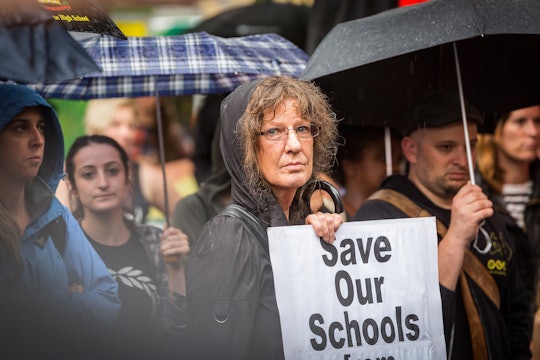News

A Child Cancer Survivor Killed Herself Due To Bullying, & It Shows We Need A Better System
Adults can be supportive and loving towards each other all they want. But if they don't put effective systems in place to make sure their kids are doing the same, their behavior might as well be a waste. Adults need to make sure that their children aren't bullying or being bullied. And when one slips through the cracks, it's on all parents to make it better. That's what an Ohio couple is saying after their 11-year-old daughter, who is a cancer survivor, killed herself in October because of bullying, according to CNN.
At age 3, Bethany Thompson underwent radiation treatments for her brain tumor. The treatments caused some nerve damage that resulted in a "crooked smile," which she was teased about at school. That, and her curly hair. The sixth-grader dealt with a particularly tough day of bullying at school before deciding to end her life. She killed herself on Oct. 19.
Although there was an outpouring of donations, condolences, and support from the community in response, the parents think there's more to be done to prevent this from happening in the future. According to the Columbus Dispatch, administrators were aware of the bullying problem but had yet to find a solution for it. Mother Wendy Fuecht told CNN that this needed to change.
Something has to change, something is broken in the system, and there are lots of different ways that this could have been handled.
Although children can often find support in guidance counselors like Bethany did, sometimes it may not be enough. Bethany wanted to put up anti-bullying posts and was not allowed to do so. In a school system, administrators, counselors, teachers, and parents should all be invested in the betterment of the young students. So what went wrong? How does bullying routinely go unfixed and get so out of hand?
Bullying laws might have something to do with it. According to Governing, bullying rates haven't changed much since the first wave of anti-bullying laws were passed in 2005. The percentage of students, about 28, who report incidents of bullying each year has stayed the same. That's almost one-third of all students! And the number doesn't even address cyberbullying. Clearly, bullying is a massive problem that needs to be dealt with. And it's puzzling that even though all 50 states have anti-bullying laws, the U.S. hasn't seen any reduction in bullying in its schools.
There are several reasons why these laws might not be working as effectively as we'd like, the first being a lack of funding for bullying prevention programs. Justin Patchin, co-director of the Cyberbullying Research Center, told Governing that, although states might have laws that discourage bullying, without the proper tools to implement comprehensive programming, teachers and students aren't equipped with the knowledge that will help them put an end to bullying.
None of the state laws offer the resources to implement effective bullying prevention programs. Making a statement (that bullying in unacceptable) is good, but the schools need money to make the programs work.
Other reasons these laws might be creating cracks that some kids like Bethany can slip through include a lack of specificity regarding bullying and punishment, according to an analysis by the Department of Education. Some states don't define bullying in their laws, and some don't identify a punishment for those who engage in it. Without those two essential components, the laws can be incredibly difficult to implement. A lack of policy backing up the laws is also another hurdle in preventing bullying. Without written guidelines in policy for educators to follow, a uniform, rigorous, and widespread approach to bullying prevention is impossible.
But the biggest obstacle to eliminating bullying might be our commitment to listening and acting on children's reports of bullying. According to Psychology Today, norms created by parents and school administrators where bullies are disciplined and bullying victims are supported would go a long way to prevent bullying in schools. Bethany's mother expressed similar sentiments. Fuecht told CNN that she could have persistently called school administrators, and she advised parents to be vigilant in reporting bullying.
Call them, call them every day if you have to and eventually they'll be tired of hearing from you and actually do something.
That's advice all parents should take to heart. While parents wait for state laws and policies to catch up, they can be taking action on their own. Parents can call legislators and school administrators and ask for a stronger system that won't let sweet children like Bethany suffer because of bullying.